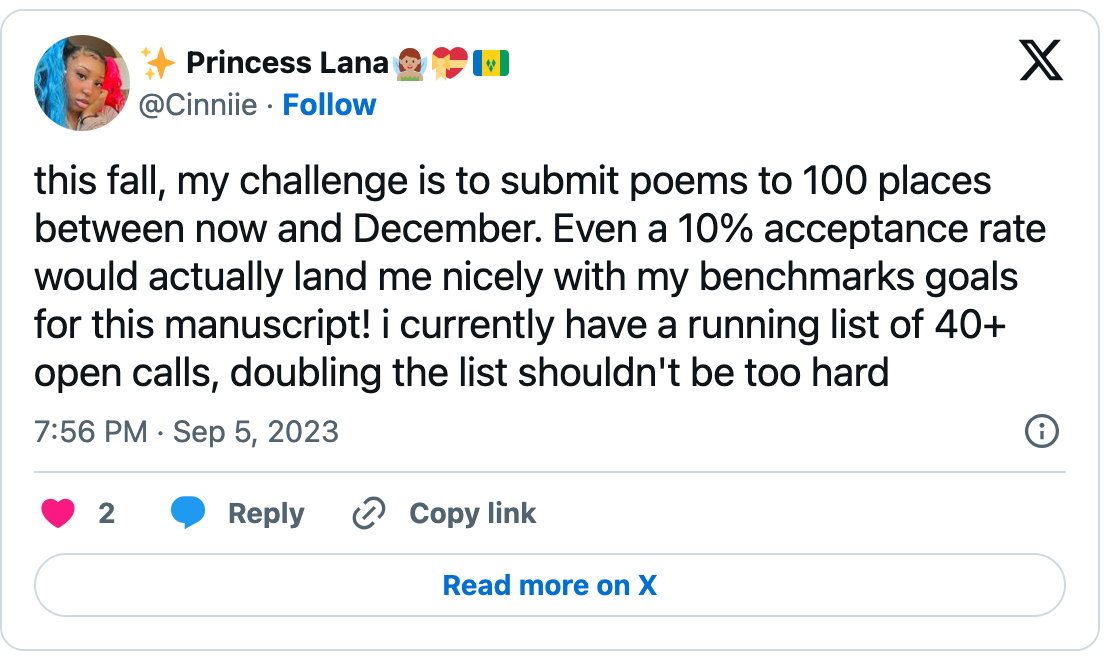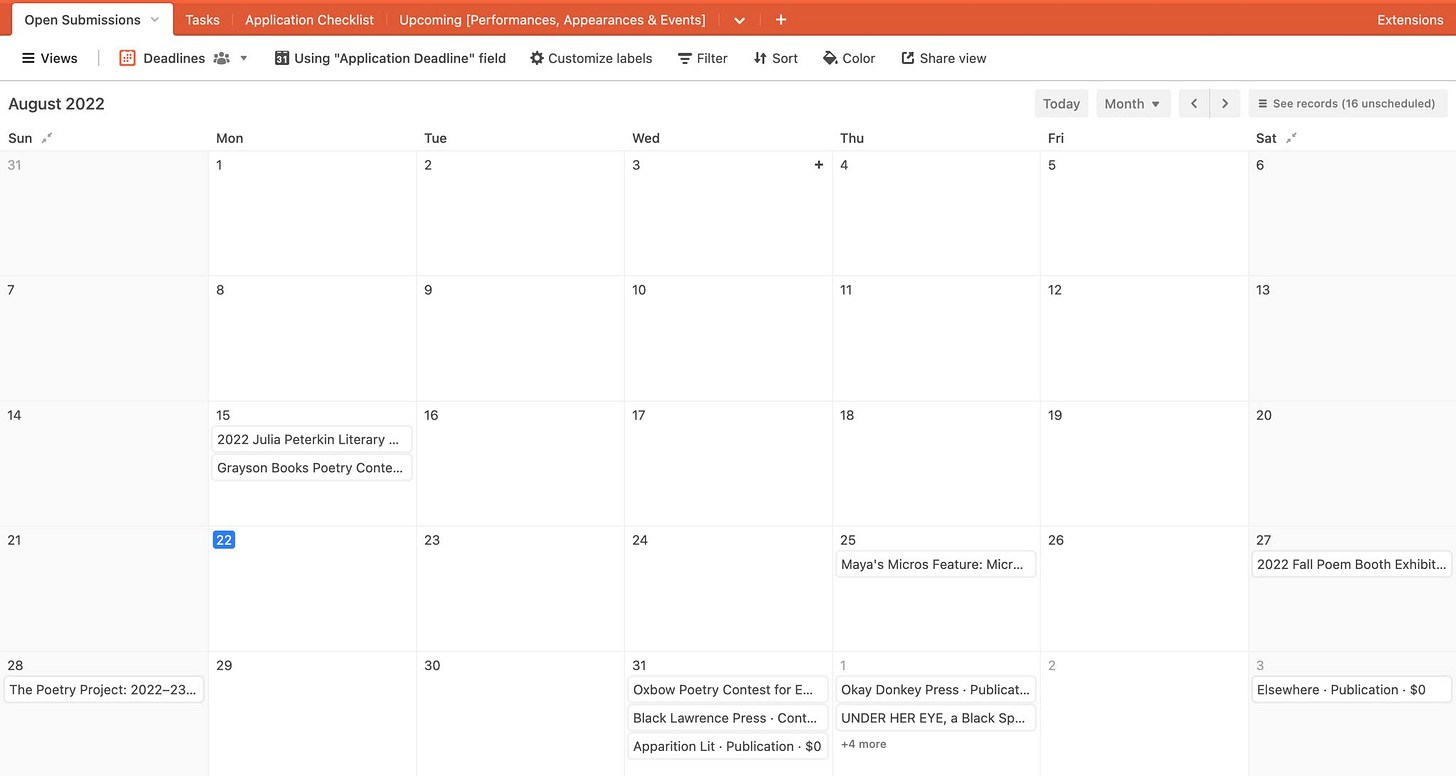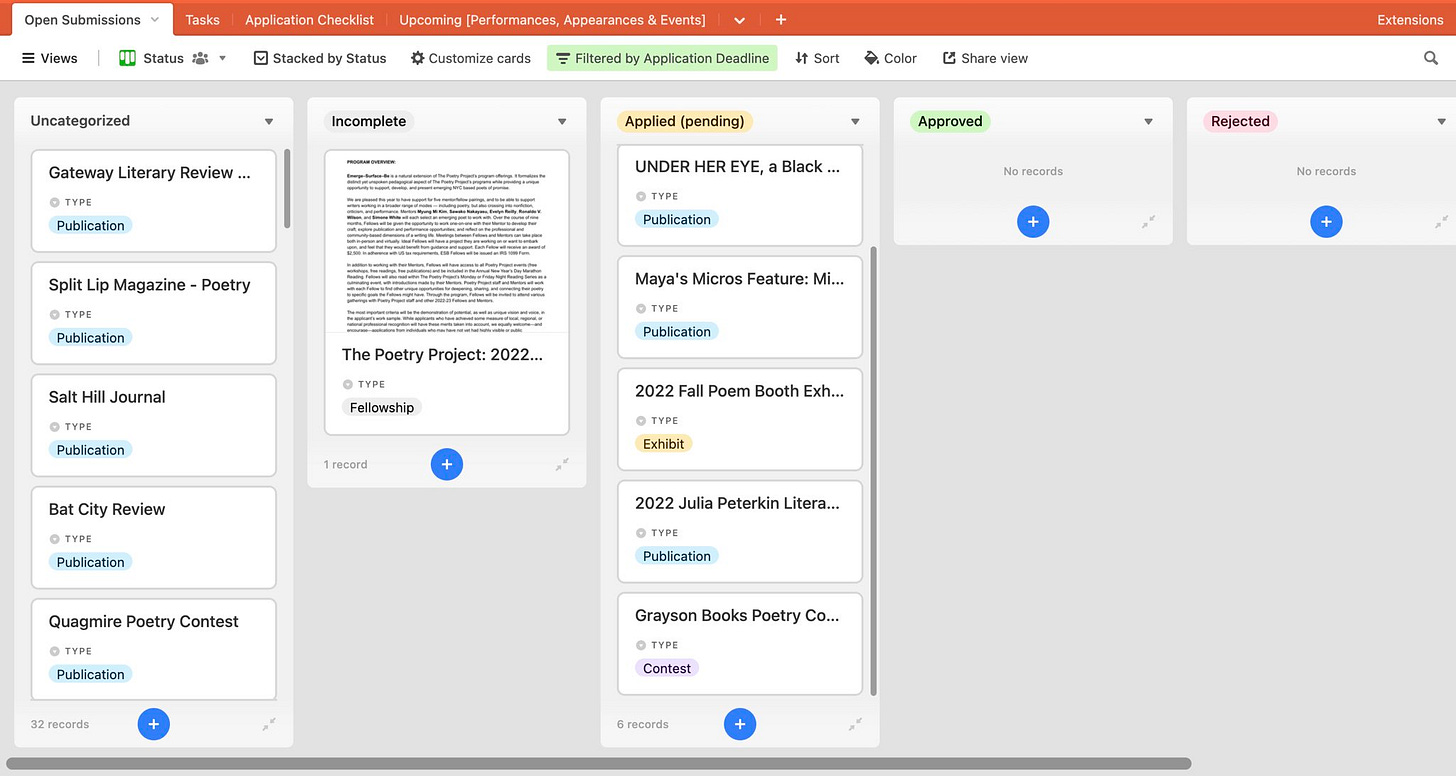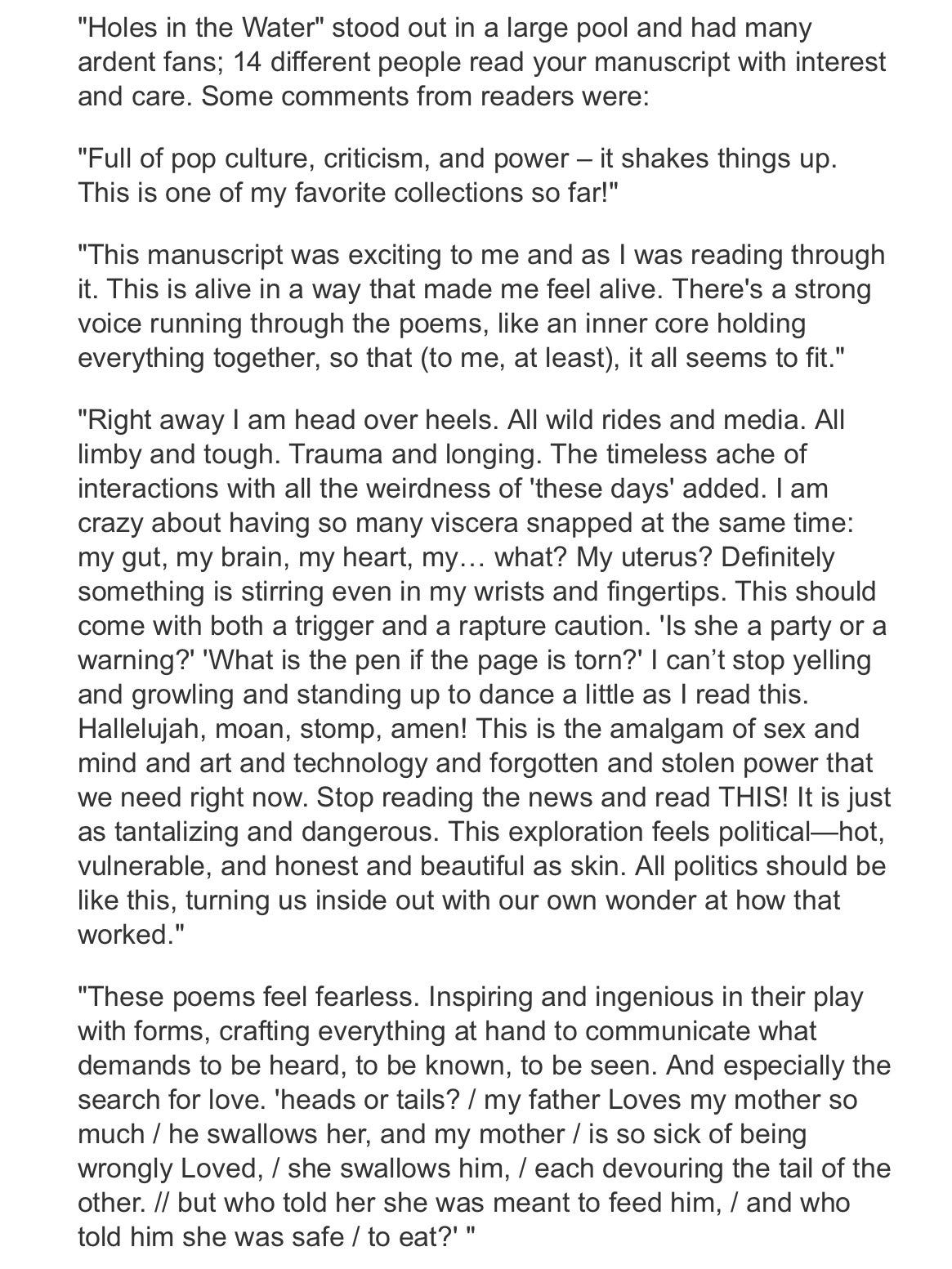creation as a gateway to the self
i spent four years working on a poetry collection. at the end of it, i was left with three dozen poems and a dream. here's what i learnt along the way.
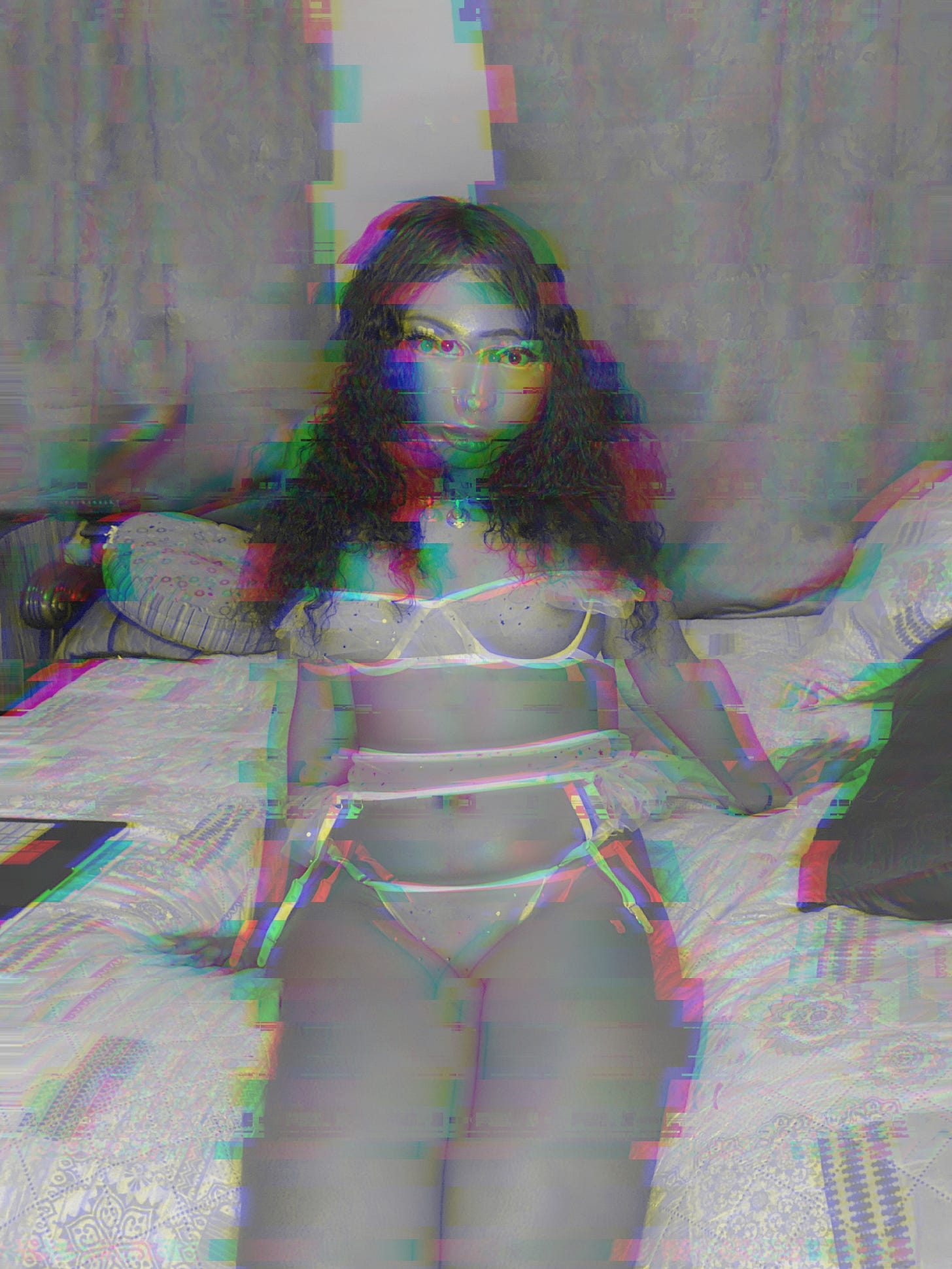
How It Started
Initially, when I first set out to draft a full collection of poems, I thought I was writing a satirical critique of internet culture. I kept circling back to the subject of social media, referencing online humor and various memes.
For example, one of the very first poems I drafted was titled, “Tinder as a Black Mirror Episode.” You can guess what it’s about. Using the title as a hook (knowing that everyone would quickly catch on to what I was saying), I’d written a poem speculating on the ways dating apps—which exhausted me to no end—could somehow one day dystopically become even more demoralizing and dehumanizing. Back in 2019, I passed it around at a weekly writing workshop I attended in the evenings after work. The feedback I received encouraged me to split the poem into two, which I did. It’s a lot better now; the ideas I introduce have a lot more breathing room than I gave originally.
The more I wrote, however, the more I realized I was writing about womanhood and sexuality and sadness—not about how silly the internet was. I had not set out to write a book about these things, but I recognized the pattern that’d emerged once I’d amassed about fifteen or so drafts—the halfway point of my writing process. It was then I understood that the internet was a setting, not a subject, and this was the point where my poetry began to really speak for itself.
Here are some of my titles:
like if you cry everytime
eli5: why we can’t tickle ourselves
girl math
lonely fans
wow this blew up! follow me on soundcloud (crybaby’s interlude)
hostage or not, sometimes it’s just nice to be held
demon time
I selected titles that made me giggle. That was my main criteria! Several titles are completely unrelated to the content of the poem or only tangentially connected if at all. In other cases, the title sets the scene. A title offers a great place to be silly, lighten the mood. I like the cheekiness of it, especially as a writer who prefers to talk around the hurt rather than naming it outright. A therapist would discourage me from intellectualizing or misdirecting from my feelings, but in poetry there’s a freedom in it, an objectivity that leads to new understandings of not only how I am affected by my experiences, but how the people around me play into it, too.
Here are some excerpts:
my favorite brush against that messy and naughty silence
came later, from a quiet benefactor. his fingers gripped
against my throat just the way i ordered, but it was too soon
to tell that this would not be beautiful, and i cried.
—Euphoria
all my reds
are chronic, my sun eclipsed,
my blood greater than the
sum of its parts: is she a party
or a warning, onlookers whisper,
afraid to hold my eyes in theirs; too much
guilt & responsibility.
— snowman in a sandcastle
at least i can polish
my demons, till they shine
like trophies, till people
start to applaud me
for being Broken so well.
— dead on arrival
And i love her because i mistake her for the sun, forgetting it can only be enjoyed if i protect myself against it.
— temp
How It’s Going
I finished the first draft of my book in late 2022. First, I breathed a sigh of relief. Then, I got to work.
During my research about the logistics of getting traditionally published as a poet—which was my goal since I had already self-published a project but now wanted to expand my reach—I learnt that it’s ideal for about 30% of a collection to have being previously published elsewhere. With a total of 35 poems altogether, I set out a goal to try and get at least ten poems placed in various publications.
Keeping Up With Deadlines
For a year, I was very diligent about submitting poems to lit mags and applying to first book contests held by small presses. I created a detailed Airtable sheet to help me keep track of all my submissions. Using this was so helpful for juggling simultaneous submissions and due dates for contests. I was even able to sync the calendar to my phone.
I used a few different tools to identify places to submit to: Submittable, Chill Subs, Galley Way, and Heavy Feather Review. I also used NYFA on occasion.
I do all my writing in Scrivener (even for my Substack essays!). Scrivener is a life saver. Many contests have specific formatting specifications. Some want numbered pages and a title in every header. Others require judges to read blind so you have to remove any mention of your name. Often, I would submit 3-5 poems at a time in a single PDF, and these were often different batches tailored to what I thought a particular press or lit mag might like. I was so grateful to have a writing program that let me just click on the titles of the documents I wanted to bundle together and be done with it. It’s a lot to keep up with! Tracking what you’ve sent to who, and when things are due is a lot. I can’t imagine going through the submission process with only Google Docs or Microsoft Word. And I can’t imagine what I would have done without my spreadsheet.
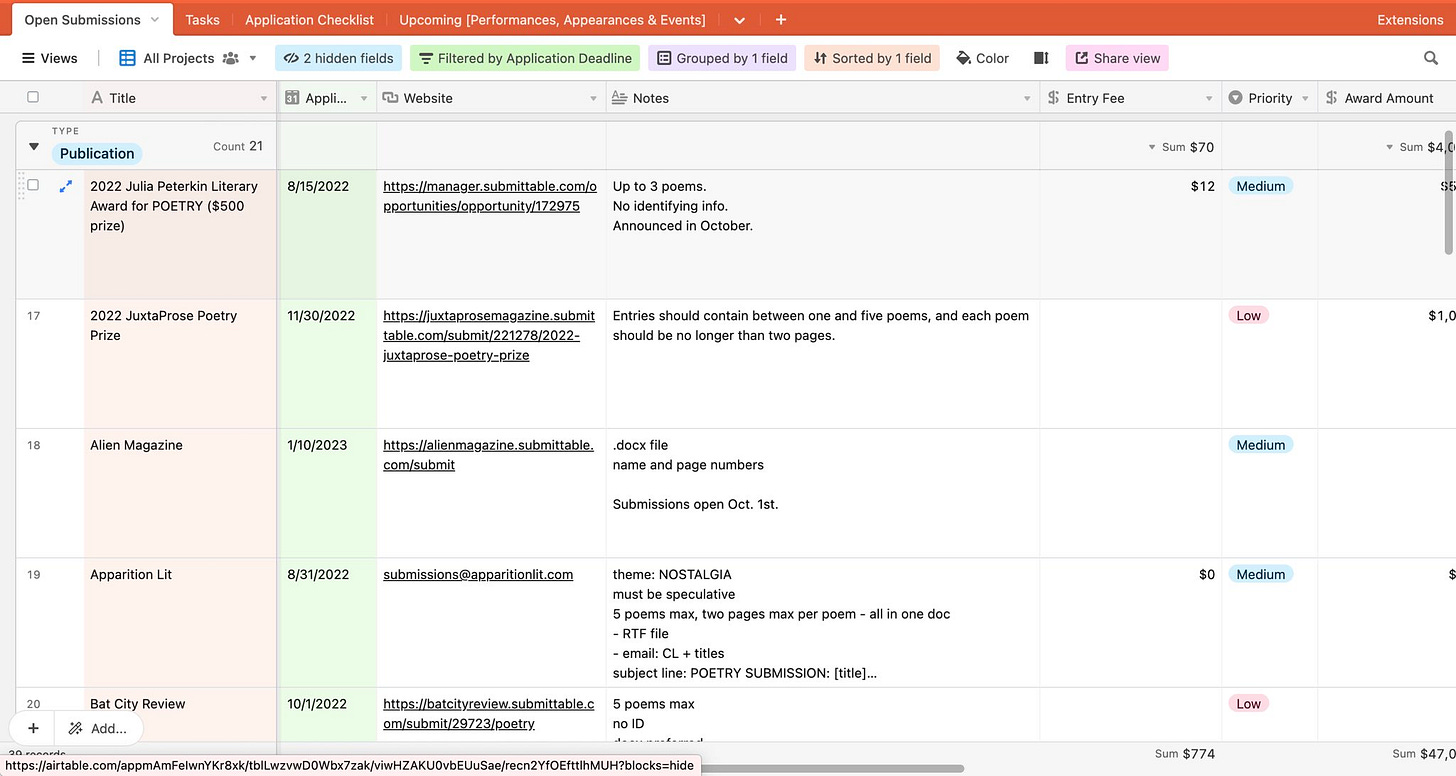
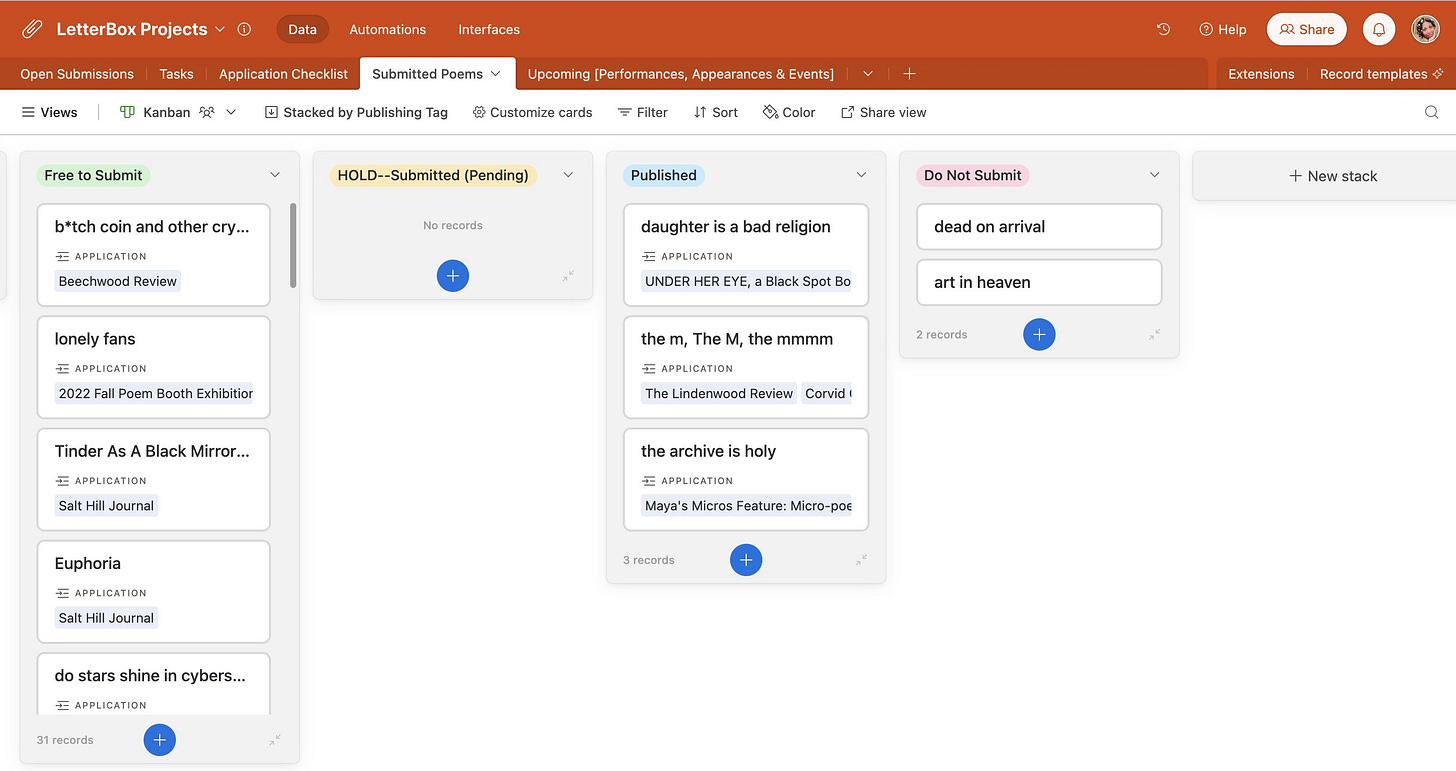
The Results are In…
My efforts did pay off, eventually: I got a few poems published! Just three, but still! I was so proud!
My biggest win was in getting listed as a semifinalist for a publishing contest. It’s the best rejection email I’ve ever gotten; the feedback from the readers made me cry. To know I had come so close to my goal of being published made me feel incredibly hopeful about my potential.
Thoughts on Presentation
A lot of poets and workshops talk about the poems themselves but there’s not a ton of guidance on the careful task of ordering your poems in a book. You want things to flow. A reader should fall through a book.
Even though poetry isn’t a linear narrative, there is still a narrative element to writing a full manuscript, and it is necessary to honor this and keep things cohesive. Initially I wanted my book to read like a story. I no longer feel it is possible for me to do this, but of course there is still a story in it. I thought a few times about adding sections to my book. Instead, I added blank spaces between groups of poems, to give the reader room to breathe and sit with the content of what my writing has to say.
A few weeks ago, I was introduced to the theory that writers have a dominant emotion in their work that colors their writing. I pondered for some days on what emotion I am operating from. My conclusion was that I am writing through the feeling of resignation. I write horror / speculative poetry, so there’s not a lot of joy or optimism, but at the same time, it isn’t fully bleak: there’s merely the understanding that hope can’t be guaranteed. Things happen, and we are, as far as my poems are concerned. I think that is the function of humor in the book, to add in some levity to the weight of what is discussed.
Being that women are my primary audience, the ones with whom I write in mind, I do my best to remain thoughtful in how my ideas are presented and what emotions they ought to invoke. There’s a disaffected undertone to the way I’ll write about trauma or my fears (which really aligns with my tendency to detach…😅) that I hope will ultimately spark an inquisition of self within my readers.
Is this Feminism?
Based on the places that went on to publish me, I’ve concluded that my work does best with feminist publications, even though I wouldn’t exactly consider my writing to be “feminist.” There’s no ideology underlining what I write; I simply relay my personal experiences. Yet, it seems that something has to merely be by or about women to count as feminist art—no call for liberation or insight necessary. It’s led me to question what “feminism” means in the art world. Like, by this logic, is my diary feminist? Jury’s still out.
Revisit & Revise
After a few months of furiously and diligently writing and submitting, I got burnt out and needed a break. I had a slew of rejections under my belt, which wasn’t demoralizing but I was tired and felt that many of my 35 poems were in need of revision if I wanted to improve my luck. But I was still too close to the work. So I took a step back to work on other things.
In 2024, I didn’t really submit anywhere and I didn’t touch my poems at all. Instead, I attended conferences, paid for feedback on specific pieces, and started new projects. I think now I am finally ready to pick up where I left off. A few months ago, I went back and marked up a lot of my poems with notes for edits. It felt great to revise my work with fresh eyes.
In a way, it’s hard for things to ever truly feel “done.” I always feel like there’s room for improvement. But that’s okay. Importantly, the feeling of incompletion hasn’t impeded my progress toward the goal. Plus, I know when I do get published, I will still have more editing ahead of me anyway.
What’s Next
More edits….
More submissions! My goal is to get published. I have a “dream” press. I hope to be published by them one day. In the meantime, I would be happy for my book to find a home with anyone who believes in the merit of the work and is able to help me get it to as wide of an audience as possible. So it’s back to tracking deadlines and identifying publications where I’d be a good fit.
More reading. Shamefully, I read very little. But! I’m working on this. Like a lot of people, I used to be a voracious reader. In many ways, being active on Substack feels like retraining myself to consume longform content on the regular. It’s good for me. Lately I’m really into reading horror. From a literary standpoint, I am trying to study what makes something “scary.”
Short term goal: Pursuing an MFA. I’d like to get a degree in Poetry and have dedicated support in the drafting process because I know myself to benefit from it greatly. I’m ready to embark on the drafting of my second book! I’ve already decided on a theme and a title. It’ll be more horror poetry, this time focused on the link between sexuality and violence. Aptly, I’m planning to call it: Body Count.




